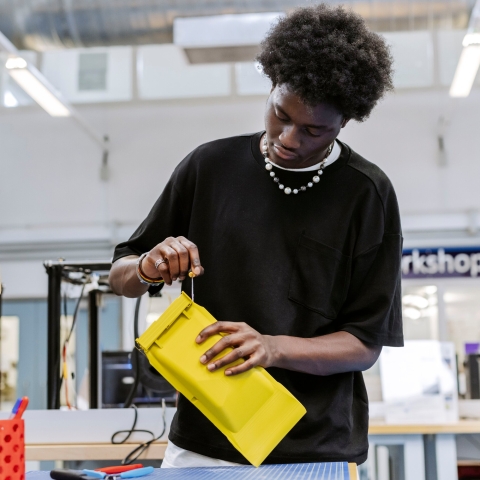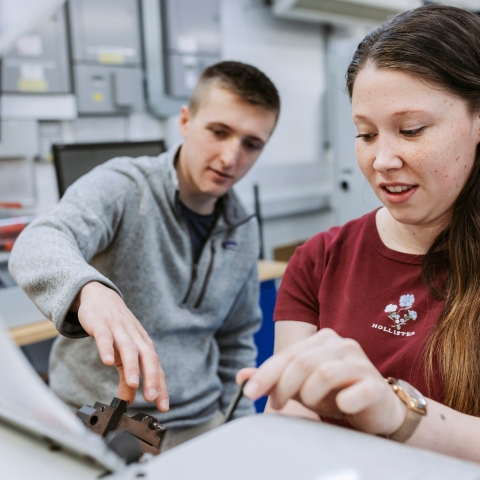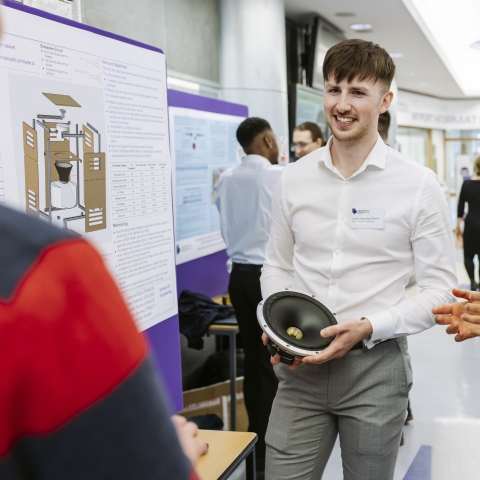
Gaining some relevant experience alongside your degree is going to be highly desirable and will strengthen your future graduate applications. The experience can not only bring you great rewards, it will give you the competitive edge when applying for future jobs. This is because you may gain an insight into the specific industry and help to develop your technical design and transferable skills.
There will be a range of opportunities to gain experience through an industrial placement, freelance work, design competitions, exhibitions and/or taking part in a specific project. However, finding and securing experience will take time and effort; employers receive many CVs every week, so you will need to stand out from the crowd. You can find out more about how to create a targeted CV and application through the information and advice available through the University website.
The key to success is to prepare thoroughly, do your research and organise your experience in good time. Think about small and medium companies, as well as large organisations. Our Engineering and Manufacturing career guide contains links to relevant resources to help you to identify prospective employers.
Types of Opportunities
Below are some examples of the different types of opportunities to gain experience while you study.
As part of your degree programme you may have the opportunity to take part in a salaried placement year, either in the UK or overseas to gain proven industrial experience by the time you graduate. This will provide you with an invaluable insight into working life and offer a unique opportunity to apply the industry knowledge you are learning as part of your studies.
Placements will also enable you to gain transferable skills in the workplace, such as communication, teamwork and time management, in addition to finding out more about a specific job role or industry, which will lead to more informed decisions upon graduating.
An internship is usually a work experience opportunity that is offered for a fixed period or a limited amount of time. Internships tend to be undertaken by students and graduates who are looking to gain more relevant/industry specific skills and experience in their particular field. These opportunities can be paid for a period of between one to four months and typically take place over the summer, with closing dates generally around January to March, but some can be earlier.
Finding placement and internship opportunities
The websites below provide further information about placement and internship opportunities related to product design:
-
MyCareer – the Careers and Employability Service's online jobs board can be used to search for internships, work experience and summer opportunities across sectors and locations.
-
RateMyPlacement – offers information on placements, internships, insights and work experience jobs with a range of relevant companies in the UK.
-
Gradcracker – as the UK’s careers website for Technology students, Gradcracker provides a search function for placements and internships relevant to your degree discipline.
-
TARGETjobs – provides a specific section on different career sectors, with the ability to search for placement and internship opportunities relating to design or engineering.
-
Prospects – has its own search tool for work experience opportunities across sectors, including design and engineering.
-
Milkround – provides a search tool for internships and industrial placements across sectors.
Getting involved in volunteering gives you the opportunity to develop employability skills and experience a variety of working environments to assist you in discovering the right career path for you. It provides the chance to network, meet new friends and boost your confidence.
Volunteering also enables you to gain practical experience and working examples to support your graduate applications. If you choose to commit a significant amount of time and impress the organisation during your volunteering, they may also provide you with a professional reference.
Volunteer to get practical experience
Approaching local organisations, charities or community groups who would benefit from your skills is one way of gaining that all-important experience. The competencies developed will be invaluable and enhance any speculative applications you make.
The Careers and Employability Service offers current students and graduates access to a Virtual Volunteering Bank, which provides local opportunities to undertake alongside your studies.
Examples of roles that the Volunteering Team have previously recruited to include:
-
STEM Ambassador – supporting a local school or community youth group by helping to inspire young people to make the most of their talents and pursue careers in STEM.
-
Home Safety Advisor with Hampshire Fire and Rescue Service – acting as a representative to engage with members of the community, visiting households in pairs to conduct a Home Fire Safety Visit; identifying fire hazards and inspecting/fitting smoke alarms if required. An opportunity to enhance communication and interpersonal skills by engaging with a range of organisations.
-
Graphic Design Volunteer with the Groundlings Theatre - developing and delivering promotional materials and website content to promote performances and activities for the organisation, offering the opportunity to utilise design and technical skills.
-
Social Media and Website Management Volunteer with Portsmouth Food Bank – assisting with the development and maintenance of the organisation’s dedicated website and promotion of work through social media channels.
You can also choose to take a Self-Employed Placement. If you are interested in establishing yourself as a freelance designer and/or establishing your own business or social enterprise, you can work for yourself during your placement year and receive support from the University's Student Startup Team. You will have access to funding opportunities, networking events and workshops to assist you in finding out all you need to know about growing your ideas.
Be proactive and try to gather inspiration and ideas from the world around you: join industry clusters and attend networking events. This is a great way to meet people working in the creative industries and will help you with your networking skills. LinkedIn is a useful platform to network with sector employers.
You can also speak to your tutors about potential contacts and opportunities for work experience over the Easter period or summer vacation.
If you wish to instigate voluntary work experience during the vacation periods please refer to the 'External sites' on the voluntary work experience section of our website.
Where to find work experience opportunities
Work experience can be invaluable when gaining employment in the product design sector. Some key online platforms to search for work experience include:
Tips to build experience
-
Explore the various areas within product design before you apply for work experience; knowing what you want to specialise in will help you to focus your research and ensure you gain relevant skills. Find out about a range of design careers and opportunities to enhance your career prospects through Creative and Cultural Skills.
-
Being proactive throughout your course by gaining experience and developing contacts in the industry will be viewed positively. You may consider becoming a member of relevant professional organisations, such as the Chartered Society of Designers to help you to expand your contacts and keep up to date with developments in the industry.
-
Consider connecting with relevant industry professionals via LinkedIn, which may enable you to make speculative applications to secure relevant experience with a company.
-
Explore online learning opportunities to continue to develop your design/technical skills. There are a range of websites that offer free or fee-paying opportunities, including Future Learn, Google Digital Garage or Udacity to name a few.
-
Speak to your tutor or other members of faculty staff researching/working in areas that interest you, as students may sometimes be recruited to work on projects over the summer period.
How to approach employers directly
When you approach an employer directly, you send them a speculative application. Speculative applications involve sending a CV and cover letter to an employer to ask if they can offer any work experience, even if the company is not currently advertising placements or internships.
Submitting a speculative application shows your interest in a specific company and your willingness to go above and beyond to develop your skills and understanding of the industry.










